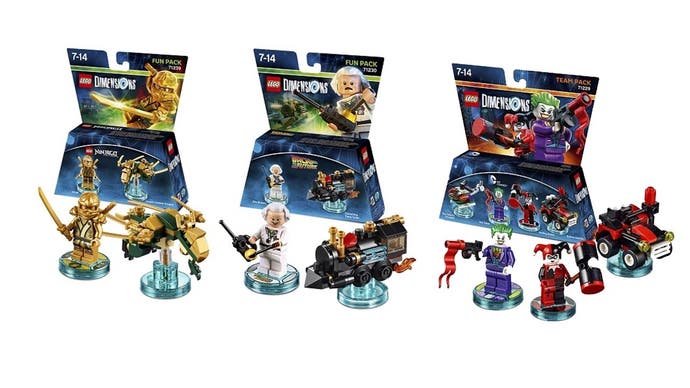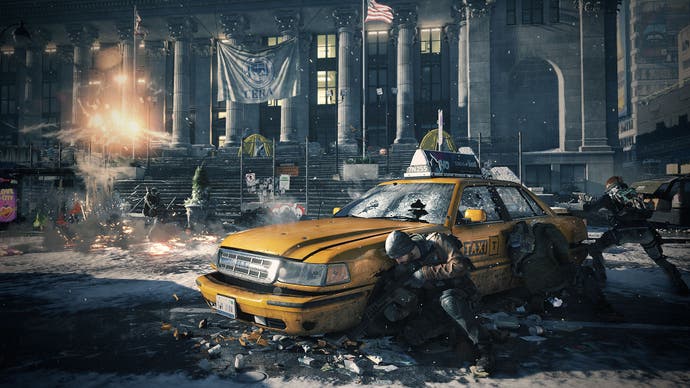In Play: The trouble with building games to last
Hitman, The Division, and video games' war with time.
In Play is a column taking a weekly sideways look at new game releases.
This week, BAFTA announced the nominations for next month's Game Awards. All things considered, the institution has done a pretty good job of wrangling the mad diversity of the video game arts into a handful of accessible fields. Anyone who's tried to categorise works in this unruly and mutable medium will know how much of a fool's errand it can be.
I want to talk about one category in particular, though: Persistent Game. Now, BAFTA doesn't mean this in the literal sense of connected game worlds where changes made by players persist - like Eve Online, for example. Its broader definition is clearly intended to reward games that are built to run and run; games that don't have to be in their year of release to sustain huge, active communities, or to be actively worked on by their developers; games like League of Legends, Final Fantasy 14, or Destiny. That's a sound move by BAFTA, because gamers are less beholden to the release schedule than ever, and most of the biggest and best games in the world today are years old.

Unfortunately, in this award's second year, the judges already seem to have confused themselves. Why is The Witcher 3, a strictly offline and self-contained RPG, nominated - just because it's really, really long? Does Lego Dimensions' aggressive, extended marketing strategy count as persistence? It seemed wrong to me, but then I realised my own bias - I had assumed persistent games necessarily had to be formed around online play. But as long as they grow and change over time, does that really need to be the case?
Like I said: fool's errand. Nevertheless, the mere existence of this award gets to an important issue. The way games evolve over time and bring their audiences with them is a remarkable development in the field of entertainment. But it's also interesting that we consider a game that's widely played for longer than a year worthy of note - because, usually, they're not.
Despite not having physical presences to maintain - despite having the huge advantage, when it comes to the ravages of time, of incorporeality - games are extremely impermanent, as artworks go. I'm not just talking about the relentless pace of the medium, driven by technological development, slash-and-burn marketing and a culture of novelty, which renders a five-year-old game outmoded and a 10-year-old one positively historic. I'm talking about the fact that, if you don't make active efforts to keep games alive, they just die. They might as well be made from rotting bananas, never mind greased cogs or oiled pistons. They need constant maintenance.

There's a constant battle to be fought updating old software so that it's compatible with current hardware. Hats off, then, to the soldiers on this frontline: remaster specialists like Bluepoint Games, or the Microsoft engineers working on Xbox One backwards compatibility. Even more heroic, because the work is not meaningfully motivated by sales, is the lone staffer working in a corner at Blizzard who this week issued Diablo 2's first patch in five years, 16 years after the game was released, ensuring compatibility with the latest computer operating systems. Meanwhile, Nintendo - unusually assiduous in keeping its old games alive via remaster and emulation, perhaps because the games are so good it knows it can still charge good money for them - this week released the Super Nintendo classics Super Metroid and The Legend of Zelda: A Link to the Past for the umpteenth time on New 3DS. (I say for the umpteenth, but the former release is, astonishingly, the first time Super Metroid been officially made available in its original 60Hz form in Europe in the 22 years since its release.)
Thanks to these coders, I can spend my flight to San Francisco for the Game Developers Conference next week playing some all-time classic games on my handheld and laptop, just as easily as I could watch a Cary Grant movie on the in-flight entertainment or thumb through a Raymond Carver paperback. That's as it should be. But getting games to this point hasn't been simple, and keeping them here is going to be harder still.
That's because the predominant solution to games' troubling relationship with the passage of time - take them online, where they can be constantly updated - is a double-edged sword. Or perhaps it's a Faustian bargain: "Come with me to the realm of the internet, where you can live forever," murmurs a digital Mephistopheles. "Your code will be forever young, and players will never stop playing... until they do, at which point it will be as if you never existed at all." If the servers are turned off, pop, the game is gone - and rolling back patches is as easy as turning back time.

This week's two big releases (I got there in the end!) are The Division and Hitman, and they are both responses to a world where "persistence" means everything - and nothing. The Division is a pretty head-on attempt to create a massively multiplayer game with staying power: it's always online, group-focused, and driven by the looping, infinite loot grind pioneered by the online RPGs of the late 90s and 2000s - games just like Diablo 2, in fact. We'll have a full review for you next week, but early signs are it's pretty successful, if dominated by the typical need of online RPGs to keep players' progress both constant and incrementally slow.
"What's perhaps most surprising about The Division, in its early hours at least, is how much of an emphasis there is on its role-playing game elements, and how there's a neat interplay between those systems that skilled squads can exploit. Perks and skills are all-important here, the latter available on MMO-ish cooldown timers and giving you access to a neat selection of tools. It's brilliantly flexible, too," wrote Martin in his initial impressions.
It's a fun game, but like any MMO, it's a game that is defined by its need to keep you playing for long periods - and a game that, without its social and online infrastructure, would simply cease to exist. It's gambling its eventual legacy for relevance in the here and now. People will probably still be able to play World of Warcraft in another 10 years' time, but will they still be able to play The Division? It's too early to tell.

Meanwhile, Hitman, being about the improvised adventures of a contract killer, is the definition of a lone wolf's game, or it ought to be. Once upon a time, a strictly offline boxed release would have been enough for it. No more. It's not persistent enough for this day and age. So Square Enix and Io Interactive have delivered something quite novel: the AAA blockbuster delivered in a season of monthly segments. It's an episodic sandbox game that's divided into playpens rather than chapters, with mini-updates and timed events to keep you teased and involved.
It's not entirely elegant - getting booted from a mission because your connection fails feels less fair in this game than in Ubisoft's, for some reason, and the segregated online and offline game saves are a tedious kind of necessity. But it's interesting, it's actually quite innovative, and more to the point, it's a great Hitman game, pregnant with experimentation and mastery and the art of deception. "Io truly understands what made previous Hitmans spectacular," wrote Edwin in our review. "Not the stalking or killing in itself, but the chance to infiltrate what is effectively a cycling theatrical production and bend it out of shape."
A great start for a grand experiment, then. Agent 47's toughest mission yet is to cheat death, or at least Mephistopheles; to have his cake and eat it. This year, Hitman is an ongoing, evolving, online spectacle that can compete for memes and mindshare with its persistent peers. Next year, it'll be a box to put on the shelf, that will grow old quickly but gracefully, and will always work when you put it in the machine. And in 2026? I'm looking forward to the remaster.

